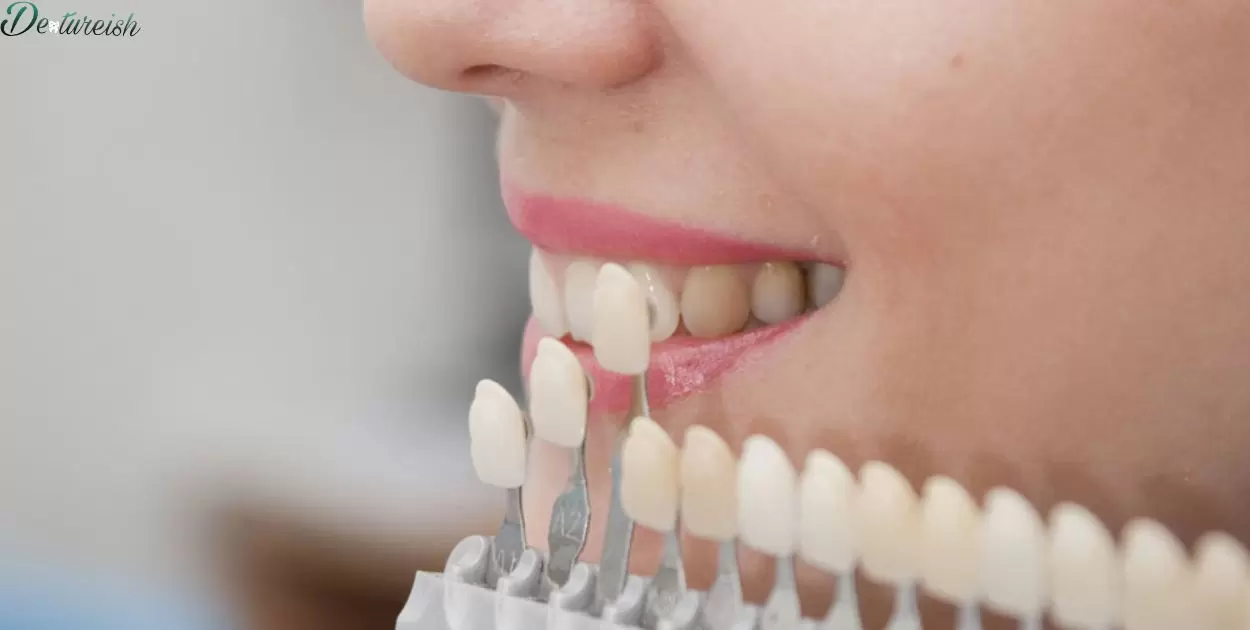Dentures are removable dental appliances used to replace missing teeth, providing functional and aesthetic benefits. Veneers, on the other hand, are thin shells applied to the front surface of natural teeth to improve their appearance by addressing issues like discoloration or minor misalignments.
Curious about enhancing your smile? Wondering, What’s the difference between dentures and veneers dive into the world of dental transformations with this quick guide. Discover the key disparities between these two smile-improving solutions, and take the first step towards a brighter, confident you!
Dentures and veneers serve different purposes in dentistry. Dentures are removable prosthetic devices used to replace missing teeth, while veneers are thin shells bonded to the front surface of teeth to improve their appearance. While dentures provide a full set of teeth, veneers are primarily cosmetic, enhancing the aesthetics of existing teeth.
Veneers Vs Dentures Cost
When comparing veneers and dentures, cost becomes a crucial factor. Veneers are thin shells that cover the front surface of teeth, typically used for cosmetic purposes. They are more expensive upfront, but they often last longer than dentures.
On the other hand, dentures are removable replacements for missing teeth. They are generally more affordable initially, making them a budget-friendly option. However, dentures may require adjustments and replacements over time, contributing to long-term costs.
Understanding Dentures: Types and Purpose
| Types of Dentures | Purpose |
| Full Dentures | Replace all missing teeth in the upper or lower jaw. |
| Partial Dentures | Fill gaps when only some teeth are missing. |
| Immediate Dentures | Provided immediately after tooth extraction, allowing for immediate tooth replacement. |
| Overdentures | Fit over existing natural teeth or dental implants, offering stability and support. |
Understanding the types of dentures is essential for making informed decisions about dental care. Full dentures replace an entire set of teeth, while partial dentures address specific gaps.
Immediate dentures are an option for immediate replacement after tooth extraction, and overdentures provide stability by fitting over existing teeth or implants. Each type serves a unique purpose, catering to different dental needs.
Exploring Veneers: Cosmetic Dentistry Solutions
Veneers enhance smiles. Dentists use thin shells of porcelain or composite resin. They cover the front surface of teeth. Veneers hide stains, chips, and gaps. They create a natural-looking, bright smile.
Cosmetic dentistry offers veneer options. Dentists customize veneers for each patient. The process involves minimal tooth reduction. Veneers last for many years with proper care. They provide a quick and effective solution for smile makeovers. Explore veneers for a confident, radiant smile.
Material Composition of Dentures
Dentures are made from a blend of materials, commonly including acrylic resin and metal. Dentists carefully select these materials for durability, comfort, and a natural appearance. The acrylic resin provides a smooth surface, while the metal framework ensures strength and stability.
The material composition of dentures plays a crucial role in their functionality and lifespan. The choice of materials directly impacts the dentures’ ability to withstand daily wear and tear, maintain a comfortable fit, and resemble natural teeth. Dentists prioritize a balanced composition to enhance both the aesthetic and functional aspects of dentures for their patients.
Material Composition of Veneers
Veneers are thin layers of wood used to cover surfaces for a decorative finish. They consist of slices of wood, typically around 1/40th of an inch thick, obtained from various tree species. Craftsmen carefully arrange these slices to showcase the natural beauty of the wood grain.
The material composition of veneers varies, with common options being oak, maple, cherry, and walnut. The choice of wood affects the veneer’s color, texture, and overall appearance. As a result, the material composition plays a crucial role in determining the aesthetic appeal and durability of the veneer.
Can You Wear Veneers Over Dentures
No, you cannot wear veneers over dentures. Veneers are thin shells designed to enhance natural teeth, not fit over removable dentures. Dentures are custom-made replacements for missing teeth that sit on the gums.
If you’re considering improving your smile with veneers, it’s important to have natural teeth as a foundation. Dentures don’t provide the necessary support for veneers, so alternative cosmetic dental options may be explored for denture wearers seeking aesthetic improvements.
Dentures vs. Veneers: Overview of the Key Differences
Here’s a simple table summarizing the key differences between dentures and veneers:
| Aspect | Dentures | Veneers |
| Purpose | Replace missing teeth | Enhance the appearance of natural teeth |
| Attachment | Removable | Permanent |
| Material | Acrylic, metal, or flexible plastic | Porcelain or composite materials |
| Treatment Area | Full or partial set | Typically applied to individual teeth |
| Functionality | Restores overall oral function | Focuses on cosmetic improvements |
| Tooth Alteration | No alteration of existing teeth | Requires minimal removal of tooth enamel |
| Maintenance | Remove for cleaning | Brush and floss like natural teeth |
| Suitability | Common for extensive tooth loss | Ideal for addressing cosmetic imperfections |
This table provides a concise overview of the main distinctions between dentures and veneers in terms of their purpose, attachment, materials, treatment area, functionality, tooth alteration, maintenance, and suitability.
When Are Dentures Recommended?
Dentures are often recommended when a person has lost multiple teeth due to decay, injury, or other dental issues. Dentists may suggest dentures to restore the ability to chew, speak, and maintain facial structure.

People with missing teeth can benefit from dentures as they offer a practical and cost-effective solution for restoring a natural-looking smile. Dentures are customized to fit comfortably and enhance overall oral function, providing individuals with a renewed sense of confidence and improved quality of life.
When Are Veneers Recommended?
Veneers are suggested by dentists to improve the appearance of teeth with discoloration, gaps, or irregular shapes. Dentists commonly recommend veneers for individuals seeking a quick and effective solution to enhance their smile.
Clean Implant Dentures are an excellent solution for patients seeking a reliable and aesthetically pleasing alternative to traditional dentures. Unlike veneers, which primarily address cosmetic issues such as stained or chipped teeth, implant dentures go beyond surface enhancements. They provide a comprehensive and lasting solution for individuals dealing with missing teeth, offering not only an improved appearance but also enhanced functionality. With Clean Implant Dentures, patients can enjoy the confidence of a complete and natural-looking smile, free from the worries associated with traditional dental prosthetics. T
Cost Considerations: Dentures vs. Veneers
Here’s a simple table comparing cost considerations between dentures and veneers:
| Cost Considerations | Dentures | Veneers |
| Initial Cost | Generally lower | Relatively higher |
| Material and Production Costs | Affordable materials | High-quality materials |
| Maintenance Expenses | Low maintenance | Minimal maintenance |
| Long-Term Durability | Less durable over time | Durable with proper care |
| Insurance Coverage | Some coverage likely | Usually cosmetic, limited |
| Replacement Costs | Periodic replacements | Rare replacements |
| Aesthetic Impact | May not look as natural | Offers a natural look |
This table provides a quick overview of cost-related considerations for both dentures and veneers. Keep in mind that actual costs can vary based on individual cases, geographic location, and specific dental procedures.
The Process of Getting Dentures
To get dentures, your dentist examines your teeth first. If dentures are needed, they remove any remaining teeth. Then, they take impressions for personalized dentures and schedule fittings for a comfortable fit. Once ready, you receive your new dentures, and the dentist guides you on proper care.
Maintaining dentures is essential. Use a denture brush for daily cleaning and soak them overnight to prevent bacteria. Regular dental check-ups ensure a snug fit, making sure your dentures remain comfortable and effective.
The Process of Getting Veneers
To get veneers, your dentist first examines your teeth and discusses the desired outcome. Then, a thin layer of enamel is removed from the front of your teeth to make room for the veneers. Impressions are taken, and temporary veneers may be placed while the permanent ones are being crafted.
After getting veneers, maintaining oral hygiene is vital. Regular brushing, flossing, and dental check-ups help ensure the longevity of your veneers. It’s important to avoid habits like teeth grinding and biting on hard objects to prevent damage to your newly enhanced smile.
Dentures Vs Veneers Vs Implants
Here’s a simple table comparing Dentures, Veneers, and Implants based on key factors:
| Factor | Dentures | Veneers | Implants |
| Purpose | Replace missing teeth | Improve appearance of front teeth | Replace missing teeth permanently |
| Material | Acrylic, metal, or flexible resin | Porcelain or composite resin | Titanium or ceramic |
| Placement | Removable | Bonded to the front of natural teeth | Surgically implanted into the jawbone |
| Durability | Typically less durable | Durable, but can chip or crack | Highly durable and long-lasting |
| Comfort | May take time to get used to | Generally comfortable | Comfortable, similar to natural teeth |
| Maintenance | Requires regular cleaning and care | Routine oral hygiene practices | Similar to natural teeth; regular care |
| Cost | Generally more affordable | Moderate cost | Higher initial cost, but long-term value |
| Longevity | 5-10 years (may need replacement) | 10-15 years (may need replacement) | Can last a lifetime with proper care |
| Aesthetics | Appearance may not be as natural | Provides a natural-looking smile | Mimics the look and feel of natural teeth |
| Procedure Complexity | Less invasive | Moderately invasive | Involves a surgical procedure |
Individual preferences, oral health, and specific dental needs can influence the choice between dentures, veneers, or implants. It’s essential to consult with a dentist to determine the most suitable option for your situation.
Maintenance and Care for Dentures
To keep dentures in good condition, clean them daily with a denture brush and mild soap. Soaking them overnight in a denture solution helps prevent stains and bacteria.
Regular dental check-ups are essential for proper denture care. Your dentist will assess the fit, make adjustments if needed, and provide guidance on maintaining oral health with dentures. Following these simple steps ensures your dentures stay comfortable and effective for a long time.
Pros and Cons of Dentures
Here’s a simple table outlining the pros and cons of dentures:
| Pros of Dentures | Cons of Dentures |
| 1. Cosmetic Improvement: Restore a natural-looking smile. | 1. Adaptation Period: Initial discomfort and adjustment. |
| 2. Affordability: Generally more budget-friendly than alternatives. | 2. Speech Difficulties: May affect speech initially. |
| 3. Non-Invasive: No surgical procedures for placement. | 3. Maintenance: Requires regular cleaning and care. |
| 4. Versatility: Suitable for various tooth loss scenarios. | 4. Bone Resorption: May lead to changes in jawbone structure over time. |
| 5. Accessibility: Widely available and accessible. | 5. Chewing Efficiency: Not as efficient as natural teeth or some alternatives. |
| 6. Reversible: Can be adjusted or replaced as needed. | 6. Replacement Period: May need replacement every 5-10 years. |
Keep in mind that individual experiences may vary, and consulting with a dentist is essential for personalized advice.
Maintenance and Care for Veneers
Taking care of veneers is simple. Brush your teeth gently with a soft toothbrush twice a day using non-abrasive toothpaste. Floss daily to keep the areas between veneers clean, preventing plaque buildup.
Avoiding certain habits safeguards your veneers. Steer clear of biting hard objects and refrain from using your teeth as tools. Regular dental check-ups ensure your veneers stay in top condition, as the dentist can address any issues promptly, keeping your smile bright and beautiful.
Pros and Cons of Veneers
Here’s a simple table outlining the pros and cons of veneers:
| Pros of Veneers | Cons of Veneers |
| 1. Improved Appearance | 1. Irreversible Procedure |
| 2. Stain Resistance | 2. Costly Investment |
| 3. Minimal Tooth Reduction | 3. Potential for Sensitivity |
| 4. Long-lasting | 4. Replacement May Be Necessary |
| 5. Customizable | 5. Not Repairable if Chipped or Cracked |
Remember that individual experiences with veneers can vary, and it’s essential to consult with a dental professional for personalized advice.
Longevity of Dentures: What to Expect
Dentures, like natural teeth, require proper care for longevity. Regular cleaning is essential to prevent stains and plaque buildup. Brushing with a denture brush and soaking them overnight keeps them looking good and maintains their functionality.

Over time, adjustments may be needed for the best fit. As jawbones change, dentures might need tweaking to ensure comfort and functionality. Regular dental check-ups help address any issues, ensuring your dentures stay reliable for the long term.
Longevity of Veneers: What to Expect
Veneers are durable dental solutions with a lifespan ranging from 10 to 15 years. Your dentist carefully bonds these thin shells to your teeth, enhancing aesthetics and durability. Proper care, like regular brushing and avoiding excessive force, can extend the longevity of your veneers.
Over time, veneers may need replacement due to wear or cosmetic concerns. Routine dental check-ups help monitor their condition, ensuring timely adjustments or replacements if necessary. Understanding the expected lifespan and maintaining good oral hygiene can significantly contribute to the lasting beauty and functionality of your veneers.
Can You Get Veneers With No Teeth
If you have no teeth, getting veneers becomes challenging. Veneers require a solid foundation, usually natural teeth, to adhere to. Without teeth, alternative options like dentures or dental implants may be considered for restoring your smile.
Dental professionals will assess your situation and recommend the most suitable solution. Dentures can replace missing teeth, while dental implants provide a stable base for various restorations, including veneers. Ultimately, the choice depends on your oral health and specific needs for achieving a natural-looking and functional smile.
Dentures and Veneers: Impact on Oral Health
Dentures and veneers can significantly impact oral health. Dentures, removable replacements for missing teeth, restore functionality and aesthetics. They require proper cleaning and regular check-ups to maintain a healthy mouth.
Veneers, on the other hand, are thin shells placed on the front of teeth to improve appearance. They’re a cosmetic solution but demand good oral hygiene to prevent issues. Regular dental visits are essential for monitoring the health of teeth with veneers and ensuring overall oral well-being.
Can You Have Veneers With Partial Dentures
You can have veneers with partial dentures. First, your dentist examines your teeth to determine if veneers are suitable. If you have partial dentures, veneers can still be applied to enhance the appearance of your natural teeth.
The process involves preparing the teeth for veneers by removing a small amount of enamel. Then, impressions are taken, and custom veneers are crafted to fit your teeth. Once ready, the veneers are bonded to your natural teeth, seamlessly blending with your partial dentures for a natural and improved smile.
Can Dentures and Veneers Be Combined?
Combining dentures and veneers is a common dental practice. Dentures replace missing teeth, while veneers enhance the appearance of existing ones. The process involves creating custom dentures and applying veneers to natural teeth for a seamless, natural look.
This combination provides a comprehensive solution for both missing and imperfect teeth. Dentures restore functionality, while veneers improve aesthetics, resulting in a confident smile. Your dentist will assess your individual needs and create a personalized treatment plan for the optimal combination of dentures and veneers.
Choosing Between Dentures and Veneers: Personal Considerations
Deciding between dentures and veneers depends on personal factors. Firstly, consider the extent of tooth damage; if it’s widespread, dentures may be more suitable. Veneers, on the other hand, are ideal for minor cosmetic issues like discoloration or small chips.
Another crucial aspect is your lifestyle. Dentures might be preferable if you seek a comprehensive solution for missing teeth, providing stability for eating and speaking. Meanwhile, veneers are a quicker fix for minor imperfections, requiring less adjustment to daily routines.
Frequently Asked Question
Is it better to get dentures or veneers?
The choice between dentures and veneers depends on individual needs. Dentures are suitable for extensive tooth loss, while veneers address minor cosmetic issues like discoloration or chips.
Are veneers real or fake teeth?
Veneers are real teeth, but they are thin, custom-made shells that cover the front surface for cosmetic purposes, enhancing appearance and addressing imperfections.
How can you tell if someone has veneers or dentures?
Spotting veneers or dentures involves observing how teeth look and function. Veneers often enhance individual teeth for cosmetic reasons, while dentures replace multiple or all teeth for functional purposes.
How long do veneers last?
Veneers typically last around 10 to 30 years with proper care and maintenance. Regular dental check-ups and avoiding habits like teeth grinding can contribute to their longevity.
Conclusion
Understanding the dissimilarity between dentures and veneers is crucial for individuals seeking dental solutions. Dentures serve as removable replacements for missing teeth, offering functional and aesthetic benefits.
On the other hand, veneers are thin shells applied to the front surface of teeth to enhance appearance. Recognizing the distinction between these two dental options empowers individuals to make informed decisions about their oral health, ensuring they receive the most suitable treatment tailored to their needs.
While dentures address tooth loss comprehensively, veneers focus on cosmetic enhancements for specific teeth. Both options contribute to restoring smiles and improving overall oral well-being, emphasizing the importance of consulting with a dental professional to determine the best course of action for individual cases.

